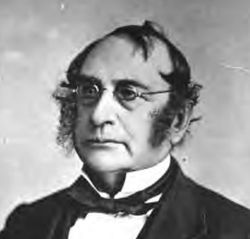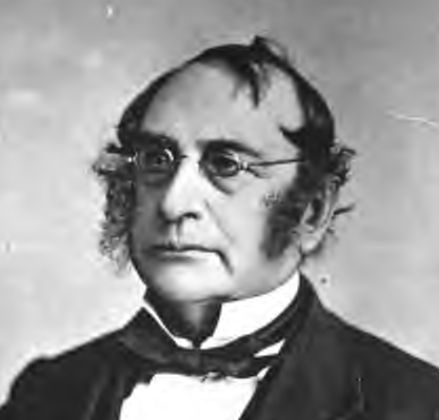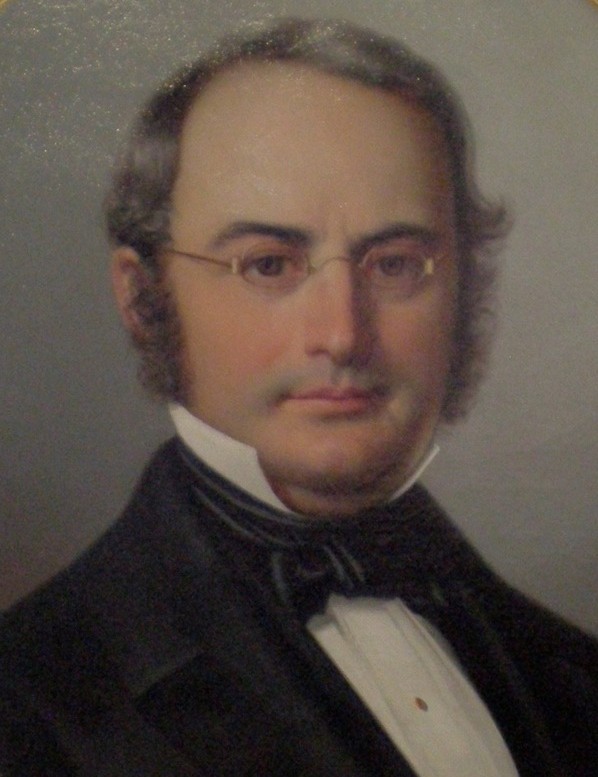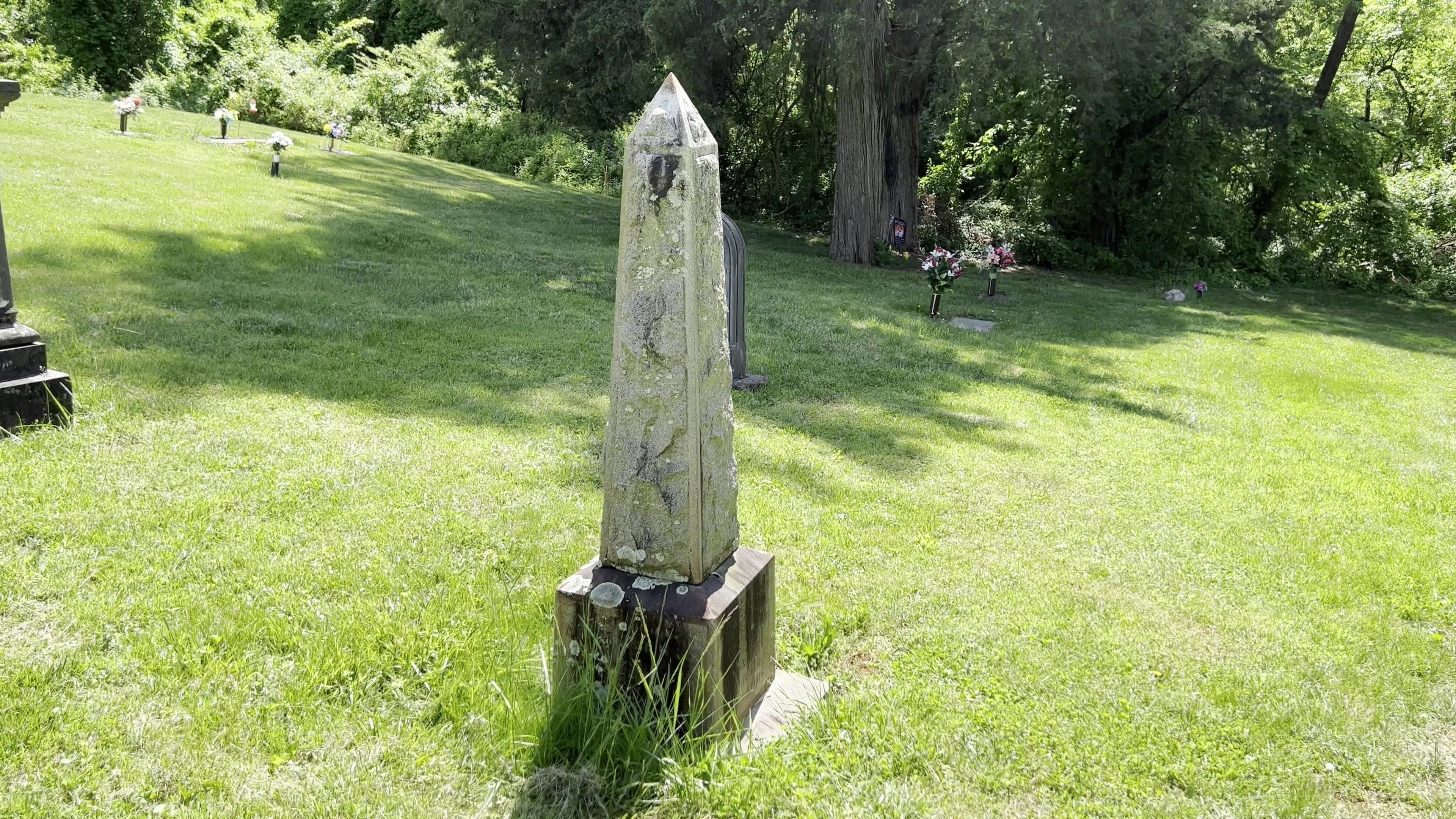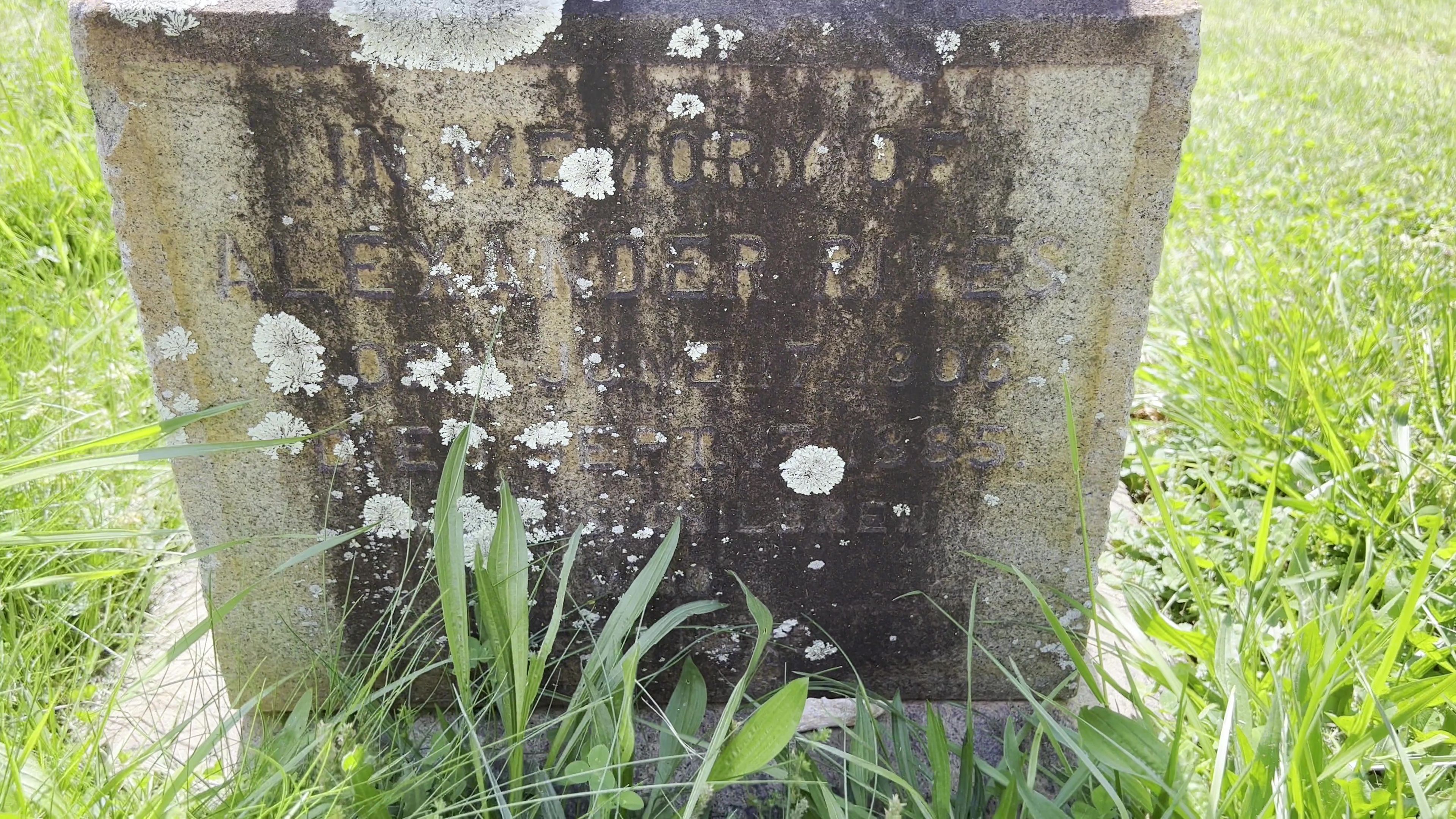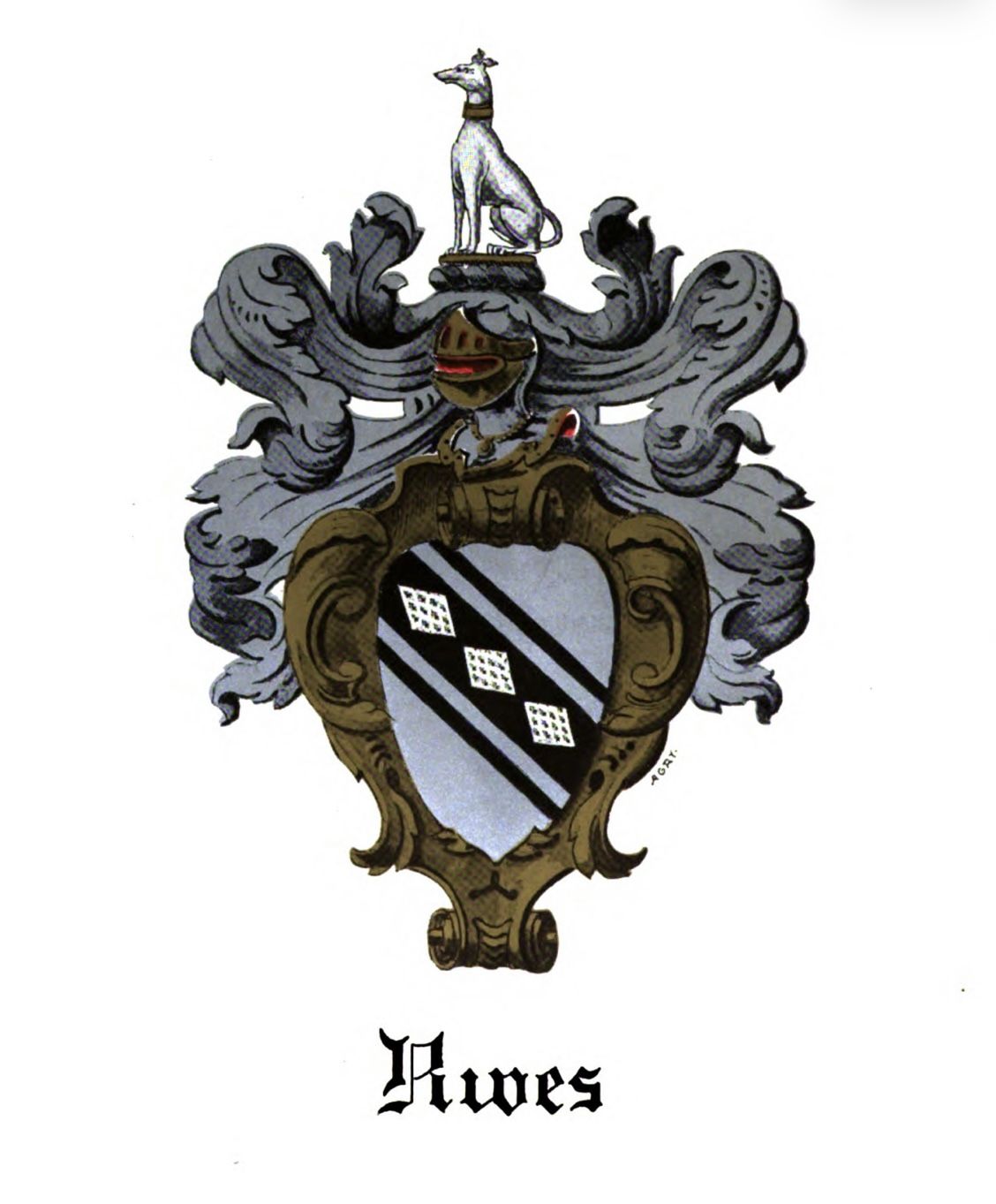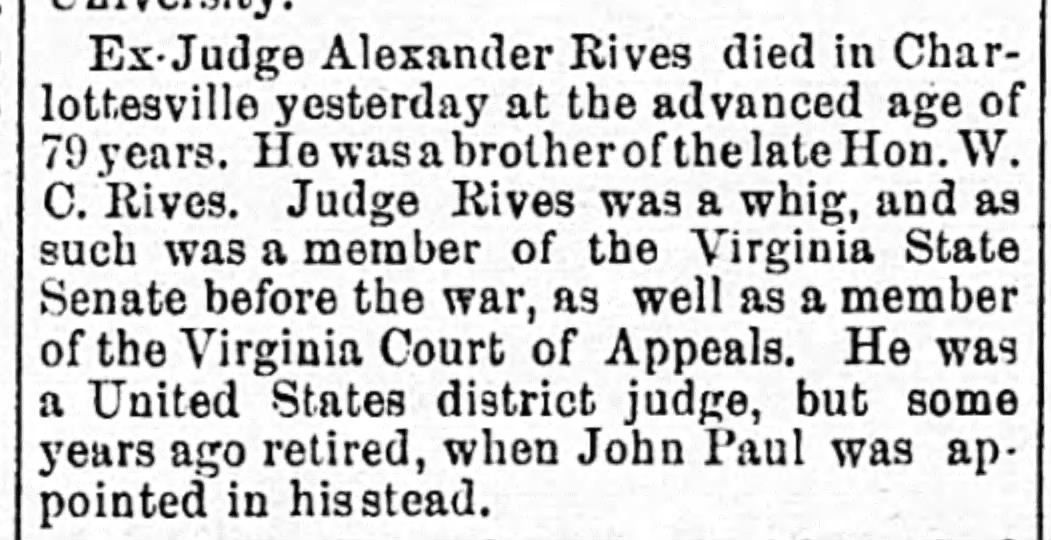Judge Alexander Rives was born at Oak Ridge, Nelson county, Virginia, June 17, 1806 ; attended Hampden-Sidney College, 1821-25 ; and was graduated from the University of Virginia in 1828, shortly thereafter declining an appointment proffered him of a professorship at Washington College. On April 4, 1829, he married, 1st, Isabella Bachem Wydown, daughter of Rev. Samuel Wydown, an Episcopalian minister and native of England.
"In early youth Mr. Rives was distinguished for his capacity and rare gifts, which ripened with advancing years and bore abundant fruit. He was an able and distinguished lawyer, an oft-honored representative of Albemarle county in the Legislature and Senate of the State, in which bodies he was always an influential member. Those who served with him well remember his flashing eloquence and brilliant oratory."
"During Jackson's administration and for some years after, Albemarle was a doubtful county. Gilmer and Southall were the Whig candidates, Randolph and Rives the Democratic, and each party was successful almost alternately, an election for the House of Delegates occurring every year. Mr. Rives, like his brother, William, was a Whig. He was a member of the State Convention of 1850-1851 ; member of the House of Delegates in 1852-3, etc., and of the State Senate in 1859-61. He was a strong Union man and bitterly opposed to secession.
"His first wife died at 'Carlton,' March 24, 1861. He married (second), May 29, 1862, Sallie Kearsley Watson, daughter of Dr. George Watson, of Richmond, Va. He was the rector of the University of Virginia and a member of the Board of Visitors, 1865-6 ; appointed Judge of the Supreme Court of Appeals of Virginia, May, 1866, and was elected Dec. 19, 1866. After the war he acted for a time with the Conservative party, and then with the Republicans ; was the candidate of the latter party in 1870 for representative of this district in the United States Congress, but was defeated by Hon. R. T. W. Duke.
"Judge Rives was appointed by President Grant, Judge of the United States District Court for the Western District of Virginia, and continued in that office until his death.
"After his first marriage he resided in Charlottesville until 1855 ; then at his seat, 'Carlton', on Monticello, until 1873 ; and then at his home, 'Eastbourne Terrace,' at Charlottesville, where he died, September 17, 1885, in his 80th year. His obituary in the Southern Churchman, October 8, 1885, says :
" 'He became a member of the Episcopal Church thirty-five years ago, and was a consistent Christian, carrying into his daily life the principles he professed. He never spoke in harsh or cruel terms to anyone. He was cast in too noble a mould to harbor ill-will or resentment. He was kind, courteous, and forbearing to all. A beautiful example to those who shared his intimate acquaintance'."
Judge Rives left no children by his second wife ; by his first wife he was the father of ten :
i. Eliza Wydown, b. Jan. 31, 1830 ; m. July 25, 1849, Prof. M. Schele De Vere (his first wife) ; and d. July 20, 1851, leaving : i. Minna Eliza De Vere, b. July 17, 1851, a lovely girl. She d. June 19, 1864.
ii. Margaret Cabell, b. Sept. 5, 1831 ; d. Sept. 26, 1867 ; unmarried.
iii. Lucy Brown, b. Jan. 6, 1834 ; m. Mch. 21, 1860, Prof. M. Schele De Vere, LL. D. (his second wife), who was appointed Professor of Modern Languages at the University of Virginia on Sept. 23, 1844, and who lived to complete a half century of devoted service as a professor in the University. No issue.
iv. Isabella, b. Jan. 12, 1836.
v. Alexander, b. Dec. 24, 1837 ; graduate in medicine of the University of Virginia and New York University ; an assistant surgeon, 15th Ala. Inf., C. S. A. ; physician ; d. May 1, 1876, in Mississippi ; unmarried.
vi. Robert, b. Nov. 25, 1839 ; M. A. and B. L. of the University of Virginia, and Utriusque Legis Doctor of Heidelberg University, Germany ; d. May 19, 1867, in Bolivar co. Miss. ; unmarried.
vii. Charles Meriwether, b. Sept. 18, 1841 ; B. L. of the University of Virginia ; 1st Lieut. Wyatt's Battery, Co. H, 1st Va. Art., C. S. A. ; killed at Cold Harbor, June 3, 1864. "A brilliant young man. Ever at his post, with silent zeal and unflinching courage."
viii. Emma Estelle, b. Nov. 3, 1843.
ix. Adela Bertha, b. Mch. 20, 1846.
x. Francis William, b. Mch. 4, 1868 ; attended University of Virginia in 1868 ; engaged in business in Charlottesville ; never married.
Childs, James Rives. Reliques of the Rives (Ryves). J. P. Bell Company, Inc., 1929.
*****
Ex Parte Virginia (1880)
In Ex Parte Virginia, decided on March 1, 1880, the U.S. Supreme Court confirmed congressional authority to enforce African Americans' rights to serve on juries in state courts. The case began when a Pittsylvania County judge named James D. Coles was indicted in a U.S. district court for violating the federal Civil Rights Act of 1875 by excluding black men from juries. Ex Parte Virginia was handed down on the same day as two other important decisions: Strauder v. West Virginia, which declared that states could not limit jury service to white men, and Virginia v. Rives, which prohibited federal courts from claiming jurisdiction over a state case when the state court excluded African Americans from the jury. In Ex Parte Virginia, the Supreme Court ruled that the Fourteenth Amendment to the U.S. Constitution, which guarantees citizens equal protection under the law, authorized Congress to require that states not exclude African Americans from juries. In these three related cases, the Supreme Court broadly interpreted the Thirteenth, Fourteenth, and Fifteenth amendments and declared that their purpose was to prohibit states from limiting the civil rights of African American citizens or treating them in a different or inferior manner from white citizens. Following the ruling, many state judges found other means to exclude African Americans from jury service.
Facts of the Case
Ex Parte Virginia was the third of three cases involving African American jury service that the Supreme Court decided on March 1, 1880. James D. Coles, a Pittsylvania County judge, was indicted on February 27, 1879, for refusing to allow African Americans to serve on juries. The federal grand juries that met in Danville and Lynchburg in February and March 1879 indicted judges from the following fourteen counties for violating the Civil Rights Act of 1875 by barring African Americans from jury service: Amherst, Appomattox, Bedford, Botetourt, Buckingham, Campbell, Charlotte, Franklin, Fluvanna, Henry, Nelson, Patrick (the court involved in Virginia v. Rives), Pittsylvania, and Roanoke. The federal District Court judge Alexander Rives had the judges arrested so that they could stand trial.
Coles petitioned the U.S. Supreme Court for a writ of habeas corpus to direct Rives to release him on the grounds that a federal judge had no legal authority to arrest, jail, or try him. James G. Field, the Virginia attorney general, also intervened on behalf of the Commonwealth of Virginia and petitioned the Supreme Court for a writ of habeas corpus to release the state judge. The Supreme Court heard arguments and decided the two petitions for the writ as one. The phrase "Ex Parte" in the title indicates that it was a judicial proceeding involving one party, the Commonwealth of Virginia, and not an adversarial proceeding between two or more parties.
Tarter, Brent. "Ex Parte Virginia (1880)." Encyclopedia Virginia, Virginia Humanities, 07 Dec. 2020.
Judge Alexander Rives was born at Oak Ridge, Nelson county, Virginia, June 17, 1806 ; attended Hampden-Sidney College, 1821-25 ; and was graduated from the University of Virginia in 1828, shortly thereafter declining an appointment proffered him of a professorship at Washington College. On April 4, 1829, he married, 1st, Isabella Bachem Wydown, daughter of Rev. Samuel Wydown, an Episcopalian minister and native of England.
"In early youth Mr. Rives was distinguished for his capacity and rare gifts, which ripened with advancing years and bore abundant fruit. He was an able and distinguished lawyer, an oft-honored representative of Albemarle county in the Legislature and Senate of the State, in which bodies he was always an influential member. Those who served with him well remember his flashing eloquence and brilliant oratory."
"During Jackson's administration and for some years after, Albemarle was a doubtful county. Gilmer and Southall were the Whig candidates, Randolph and Rives the Democratic, and each party was successful almost alternately, an election for the House of Delegates occurring every year. Mr. Rives, like his brother, William, was a Whig. He was a member of the State Convention of 1850-1851 ; member of the House of Delegates in 1852-3, etc., and of the State Senate in 1859-61. He was a strong Union man and bitterly opposed to secession.
"His first wife died at 'Carlton,' March 24, 1861. He married (second), May 29, 1862, Sallie Kearsley Watson, daughter of Dr. George Watson, of Richmond, Va. He was the rector of the University of Virginia and a member of the Board of Visitors, 1865-6 ; appointed Judge of the Supreme Court of Appeals of Virginia, May, 1866, and was elected Dec. 19, 1866. After the war he acted for a time with the Conservative party, and then with the Republicans ; was the candidate of the latter party in 1870 for representative of this district in the United States Congress, but was defeated by Hon. R. T. W. Duke.
"Judge Rives was appointed by President Grant, Judge of the United States District Court for the Western District of Virginia, and continued in that office until his death.
"After his first marriage he resided in Charlottesville until 1855 ; then at his seat, 'Carlton', on Monticello, until 1873 ; and then at his home, 'Eastbourne Terrace,' at Charlottesville, where he died, September 17, 1885, in his 80th year. His obituary in the Southern Churchman, October 8, 1885, says :
" 'He became a member of the Episcopal Church thirty-five years ago, and was a consistent Christian, carrying into his daily life the principles he professed. He never spoke in harsh or cruel terms to anyone. He was cast in too noble a mould to harbor ill-will or resentment. He was kind, courteous, and forbearing to all. A beautiful example to those who shared his intimate acquaintance'."
Judge Rives left no children by his second wife ; by his first wife he was the father of ten :
i. Eliza Wydown, b. Jan. 31, 1830 ; m. July 25, 1849, Prof. M. Schele De Vere (his first wife) ; and d. July 20, 1851, leaving : i. Minna Eliza De Vere, b. July 17, 1851, a lovely girl. She d. June 19, 1864.
ii. Margaret Cabell, b. Sept. 5, 1831 ; d. Sept. 26, 1867 ; unmarried.
iii. Lucy Brown, b. Jan. 6, 1834 ; m. Mch. 21, 1860, Prof. M. Schele De Vere, LL. D. (his second wife), who was appointed Professor of Modern Languages at the University of Virginia on Sept. 23, 1844, and who lived to complete a half century of devoted service as a professor in the University. No issue.
iv. Isabella, b. Jan. 12, 1836.
v. Alexander, b. Dec. 24, 1837 ; graduate in medicine of the University of Virginia and New York University ; an assistant surgeon, 15th Ala. Inf., C. S. A. ; physician ; d. May 1, 1876, in Mississippi ; unmarried.
vi. Robert, b. Nov. 25, 1839 ; M. A. and B. L. of the University of Virginia, and Utriusque Legis Doctor of Heidelberg University, Germany ; d. May 19, 1867, in Bolivar co. Miss. ; unmarried.
vii. Charles Meriwether, b. Sept. 18, 1841 ; B. L. of the University of Virginia ; 1st Lieut. Wyatt's Battery, Co. H, 1st Va. Art., C. S. A. ; killed at Cold Harbor, June 3, 1864. "A brilliant young man. Ever at his post, with silent zeal and unflinching courage."
viii. Emma Estelle, b. Nov. 3, 1843.
ix. Adela Bertha, b. Mch. 20, 1846.
x. Francis William, b. Mch. 4, 1868 ; attended University of Virginia in 1868 ; engaged in business in Charlottesville ; never married.
Childs, James Rives. Reliques of the Rives (Ryves). J. P. Bell Company, Inc., 1929.
*****
Ex Parte Virginia (1880)
In Ex Parte Virginia, decided on March 1, 1880, the U.S. Supreme Court confirmed congressional authority to enforce African Americans' rights to serve on juries in state courts. The case began when a Pittsylvania County judge named James D. Coles was indicted in a U.S. district court for violating the federal Civil Rights Act of 1875 by excluding black men from juries. Ex Parte Virginia was handed down on the same day as two other important decisions: Strauder v. West Virginia, which declared that states could not limit jury service to white men, and Virginia v. Rives, which prohibited federal courts from claiming jurisdiction over a state case when the state court excluded African Americans from the jury. In Ex Parte Virginia, the Supreme Court ruled that the Fourteenth Amendment to the U.S. Constitution, which guarantees citizens equal protection under the law, authorized Congress to require that states not exclude African Americans from juries. In these three related cases, the Supreme Court broadly interpreted the Thirteenth, Fourteenth, and Fifteenth amendments and declared that their purpose was to prohibit states from limiting the civil rights of African American citizens or treating them in a different or inferior manner from white citizens. Following the ruling, many state judges found other means to exclude African Americans from jury service.
Facts of the Case
Ex Parte Virginia was the third of three cases involving African American jury service that the Supreme Court decided on March 1, 1880. James D. Coles, a Pittsylvania County judge, was indicted on February 27, 1879, for refusing to allow African Americans to serve on juries. The federal grand juries that met in Danville and Lynchburg in February and March 1879 indicted judges from the following fourteen counties for violating the Civil Rights Act of 1875 by barring African Americans from jury service: Amherst, Appomattox, Bedford, Botetourt, Buckingham, Campbell, Charlotte, Franklin, Fluvanna, Henry, Nelson, Patrick (the court involved in Virginia v. Rives), Pittsylvania, and Roanoke. The federal District Court judge Alexander Rives had the judges arrested so that they could stand trial.
Coles petitioned the U.S. Supreme Court for a writ of habeas corpus to direct Rives to release him on the grounds that a federal judge had no legal authority to arrest, jail, or try him. James G. Field, the Virginia attorney general, also intervened on behalf of the Commonwealth of Virginia and petitioned the Supreme Court for a writ of habeas corpus to release the state judge. The Supreme Court heard arguments and decided the two petitions for the writ as one. The phrase "Ex Parte" in the title indicates that it was a judicial proceeding involving one party, the Commonwealth of Virginia, and not an adversarial proceeding between two or more parties.
Tarter, Brent. "Ex Parte Virginia (1880)." Encyclopedia Virginia, Virginia Humanities, 07 Dec. 2020.
Inscription
and his children:
Margaret Cabell
Alexander
Family Members
Advertisement
Explore more
Sponsored by Ancestry
Advertisement
